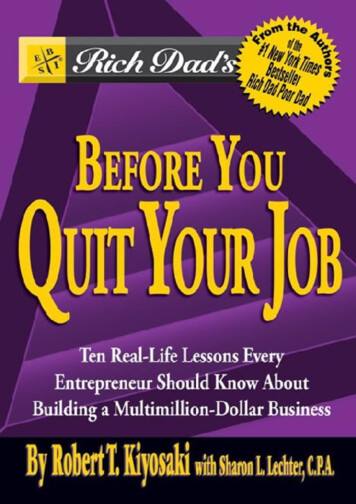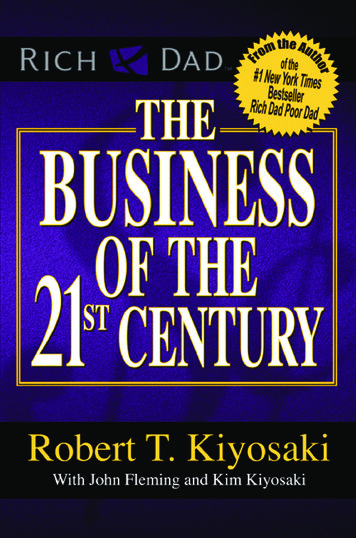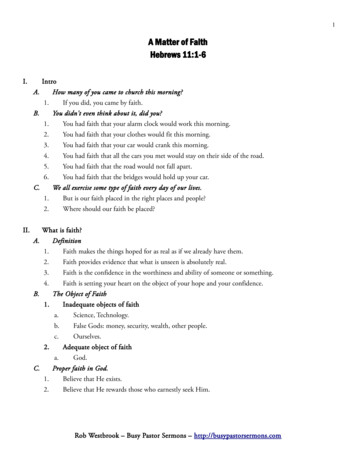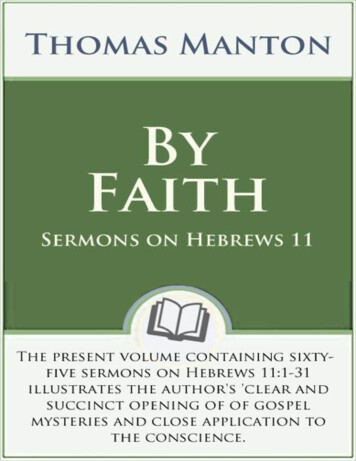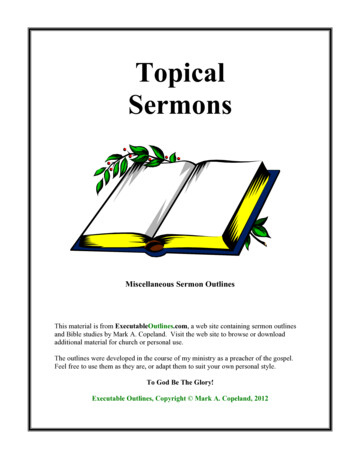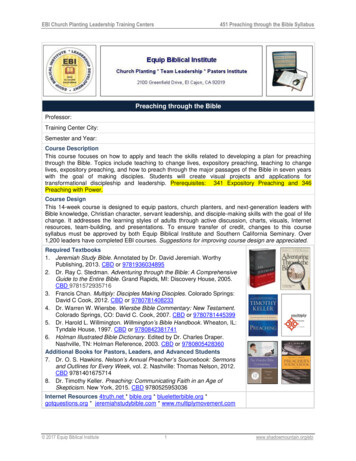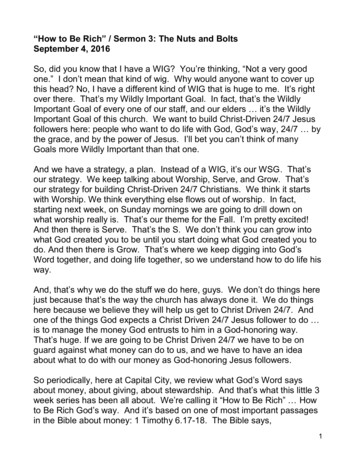
Transcription
“How to Be Rich” / Sermon 3: The Nuts and BoltsSeptember 4, 2016So, did you know that I have a WIG? You’re thinking, “Not a very goodone.” I don’t mean that kind of wig. Why would anyone want to cover upthis head? No, I have a different kind of WIG that is huge to me. It’s rightover there. That’s my Wildly Important Goal. In fact, that’s the WildlyImportant Goal of every one of our staff, and our elders it’s the WildlyImportant Goal of this church. We want to build Christ-Driven 24/7 Jesusfollowers here: people who want to do life with God, God’s way, 24/7 bythe grace, and by the power of Jesus. I’ll bet you can’t think of manyGoals more Wildly Important than that one.And we have a strategy, a plan. Instead of a WIG, it’s our WSG. That’sour strategy. We keep talking about Worship, Serve, and Grow. That’sour strategy for building Christ-Driven 24/7 Christians. We think it startswith Worship. We think everything else flows out of worship. In fact,starting next week, on Sunday mornings we are going to drill down onwhat worship really is. That’s our theme for the Fall. I’m pretty excited!And then there is Serve. That’s the S. We don’t think you can grow intowhat God created you to be until you start doing what God created you todo. And then there is Grow. That’s where we keep digging into God’sWord together, and doing life together, so we understand how to do life hisway.And, that’s why we do the stuff we do here, guys. We don’t do things herejust because that’s the way the church has always done it. We do thingshere because we believe they will help us get to Christ Driven 24/7. Andone of the things God expects a Christ Driven 24/7 Jesus follower to do is to manage the money God entrusts to him in a God-honoring way.That’s huge. If we are going to be Christ Driven 24/7 we have to be onguard against what money can do to us, and we have to have an ideaabout what to do with our money as God-honoring Jesus followers.So periodically, here at Capital City, we review what God’s Word saysabout money, about giving, about stewardship. And that’s what this little 3week series has been all about. We’re calling it “How to Be Rich” Howto Be Rich God’s way. And it’s based on one of most important passagesin the Bible about money: 1 Timothy 6.17-18. The Bible says,1
“Teach those who are rich in this world” That’s us, that’s what wefocused on two weeks ago. Teach those who are rich in this world He says, “not to be proud and not to trust in their money, which is sounreliable.” Because money has this powerful ability to make usproud, and to tempt us to trust it, instead of God. And that’s what wefocused last week. Don’t trust the gift, trust the giver. If you werehere last week, do you remember our aphorism? “I will not trust inriches, but in the one who richly provides.” And then it says, Instead, “Tell (us rich people) them to use theirmoney to do good. They should be rich in good works and generousto those in need, always being ready to share with others.” Andthat’s the part we want to expand on today.So last week was about being on guard against what our money can do tous, as rich Christians. This week is about what God wants us to do withour money, as rich Christians. And here’s the deal: God has the right to tellus to use “our” money (1) Because he is God, and we’re not; we areGod “followers”; and (2) because in reality it’s all his! Everything you thinkyou own – is really his. He tell us to use it to do good, to be rich in goodworks, to generous to those in need, to share his stuff, the stuff he letsus use. Well, this morning we’re going to get right down to the basics ofwhat that means.Now, before I preach (just a little) I need to teach. I’m going to try to layout what the Bible says about managing our money as simply and asclearly as I can. Some of this is going to sound strange to those of youwho haven’t studied the Bible much, but this stuff is pretty basic. Forthose of you who are not Jesus followers yet, some of this will sounddownright weird. That’s okay. For us it’s basic. This is how a Jesusfollower honors God with the money God entrusts to us. I want to talkabout: What we give? And To whom we give? And How we give? AndWhen do we give? And the one that bites the most How much do wegive? So here goes: nothing fancy, just the basics.(1) What do we give? Well, this one is pretty easy: He is God, and we areGod-followers, so he gets the first and the best. Anything less is notworthy of him. Here’s what the Bible says. It says, “Honor God witheverything you own; give him the first and the best.” (Proverbs 3.9) Sohe’s the first line on our budget. His is the first check we write on bill day.2
It’s what he deserves. He’s God, guys! We owe him everything.Giving God the second part, or the third part – giving God leftovers – isn’tjust inadequate, it is evil. He deserves the first and the best.Here’s a diagram of the financial priorities of a Jesus follower. God gets the first part. In fact, if he doesn’t, the Bible calls it robbery, embezzlement, stealing. The Bible says we actually rob Godwhen we don’t give the first part back. You see, we treat money likeit’s ours, and we can do what we want with what is ours. And Godsays, “Uh us, it’s mine; and the first part comes back to me.” That’sdoing life with God, God’s way. God gets the first part The second priority of a Jesus follower – if possible – is savings. Ifyou have an emergency fund, you can handle some unexpected bills,and you will also be able to respond when God nudges you to begenerous. God first, savings next (if you can), necessities third. That’s stuff likerent, utilities, food, car payment, clothes, medical. After the necessities, the next priority is debt. We try to eliminate asmuch debt as we can, because the Bible teaches us that theborrower is a servant to the lender, and we don’t want to serveanyone but God. The last priority Extras. Eating out, movies, tickets to the game,shoes I don’t need, a new phone I don’t need. That stuff is great.God doesn’t mind us enjoying extras, I think. It is not Goddishonoring to spend some money on extras if your priorities areright.But we tend to mess it up. We tend to spend on extras first driving upour debt. Then we barely have enough to cover the necessities. Andusually there are no leftovers for savings, or for God. Listen guys, beingChrist-Driven 24/7 means putting our priorities in order – especially givingGod the first part. That’s just basic to doing life with God, God’s way.In fact, giving God the first part back is an act of worship. It’s been part ofour worship for millennia. Here at Capital City we intentionally put offeringboxes at each worship station. There it is: a black offering box, sitting rightnext to the Lord’s Supper. And it belongs there. You know that taking theLord’s Supper is an act of worship. Well, giving God the first part back isalso an act of worship. This is a worship station. That box is our3
acknowledgement that everything we have is from him; and it’s still all his,really; and he deserves the first and the best of everything.(1) What do we give? We give God the first part. (2) To whom do wegive? James tells us rich people to use our money to do good. And theBible gives us some instructions as to what that means.This may catch some of you by surprise; you might even push back a little.(1 Timothy 5.8 on screen) But I think the Bible teaches that it starts withfamily. The Bible teaches that a Christian who doesn’t take care of hisfamily in an emergency shames the church, and is worse than anunbeliever. Now I’m not talking about spending my first part on the ordinarystuff my family needs. We’re supposed to handle the ordinary withwhatever is left over after the first part goes to God. But if a member ofyour family is in a real mess, a crisis they can’t handle alone. The way Iread it – I hope this is God’s heart – the way I read it is that sometimes I can usesome of my first-part to do good for my family, to be rich in good works towardsmy family, to share with my family. I’m not talking about providing them withextras, I’m talking about helping them with the basics.The second to whom is the church. Listen, guys, God expects us Jesusfollowers to do this life with God together, as part of a church family. Andwhen we become part of a church family, we are all expected tocontribute. Now for some of you here this morning, Capital City is not yourhome. Maybe you are just passing through; maybe you are justchecking us out. That’s cool – this black box isn’t for you, yet. On the other hand, some of you consider Capital City your home, butyou don’t like what we are doing, and you don’t want to support whatwe are doing. So you hold back. I suppose ultimately that’s betweenyou and God. But guys, being part of a church family is more aboutpurpose, than about preference. It’s not about what I like, it’s aboutgetting the job done (XD 24/7). So if you have chosen Capital Cityas your church family, I think God expects you to pitch in. And there are others who are kind of like a lot of kids. They treattheir church like a hotel, not a home. They kind of blow through,leave a mess for others to clean up, maybe drop a few bucks in thebox or the bucket, complain if things are not quite right, and headback out. That was never God’s intent. That is not God-honoring.4
Did you know that if we are normal here at Capital City, about 25% ofyou (1 in 4) never contribute anything financially to this church. Zero.If we are normal, 5% of you (1 in 20) contribute about 60% of what isgiven, financially. And if we are normal, 20% of our church family (inin 5 of ou) are responsible for 80% of all the money given? One morething, guys: Did you know that if all the members of this church familyactually did contribute a fair share, this church would never, everstruggle financially? You see, we know this stuff in the Bible, butwe’re pretty good at finding back doors, aren’t we?So the first to whom is family – when a family member is in crisis mode.The next to whom is church. The third to whom is just pure compassion.We give to missions, we give to charities. I support World Vision, and StJude Children’s Hospital. You might support a missionary, or a place likethe Soup Kitchen, or the Pregnancy Center, or the Women’s Shelter. Wedo some of that as a church, but we can also do it as individuals.Guys, I think those are the biblical priorities for giving. Now, it’s probablynot wise, because I know people watch me. But I don’t know that I haveever dropped a check in that black offering box. I don’t write many checks,any more. But I can tell you that every week there’s a check that goes outfrom my online banking app to a member of my family who is in a mess,there is a check that comes to this church, and there are checks that goout to World Vision, and St Jude.(1) What do we give? We give him the first part back. (2) To whom do wegive that first part? We take care of family, we take care of church, wetake care of people. (3) How do we give? Well we do it a littledifferently here at Capital City. Most churches pass an offering plate, oran offering bag. We used to do that here. We used to pass thecommunion trays up and down the rows, and then follow it up with theoffering trays. But we decided that was too passive. Worship issomething we do. There is something significant, we think, about gettingout of our seats and going to a worship station. It’s not so passive now.We go to take the Lord’s Supper; we go to give. It was risky. Wefigured offerings would go down when we stopped passing the plate. Butwe thought the symbolism was that important.5
The problem is, times are changing. And to be honest, these worshipstations make it hard for some of our church family to give. Do you knowwhy? Not because they don’t want to give, but simply because a whole lotof us don’t carry cash any more, and we don’t use checks. It’s all online.Sometimes I can’t even find my checkbook now – it’s all online. We’vehad younger staff here who have never written a check, ever -- and whorarely carry cash. But giving is still part of worship. So how do peoplegive in a world that is changing?Well, when we started preparing for online giving, we had a guy on ourweb-team who said, “If you go to online giving, I’ll leave the church. Itsends the wrong message.” Well, we started offering online giving, and heleft the church. We didn’t do it because we were money hungry; we did itbecause that’s how a generation manages their money. The world ischanging. So now you old fashioned guys can still put a check, or cash,into one of these black boxes every Sunday morning. Or you can useonline banking on your computer to send a check to the church everyweek, or every month. That’s what I do. Or you can go to Capital City app,or the Capital City website, and you can give online there. In the nextcouple weeks I think you’ll be able to give by texting, if you choose. Somechurches are going to kiosks in the foyer. Here’s the deal guys, the priorityof giving our first part back to God doesn’t change; how we give has tomorph, as our world changes.That’s the what, that’s the to whom, that’s the how. How about the when?When do we start giving? And how often do we give? Well, two pieces. This first one is really big: If you are not giving your first part back toGod now, start now not later. A lot of folks tell God they’ll givelater: next week, next month, next year, once they get that raise, orpay off that bill, or get that new job. But guys, giving God the firstpart is something we Jesus followers do now, not later. And we make it a habit. Giving him the first part is not something wedo once a year at tax time. It’s not once or twice a year whenbonuses come. We make it a habit to give him the first part back -whenever he graces us with money. The Bible says, “On the firstday of each week, you should each put aside a portion of the moneyyou have earned.” (1 Corinthians 16.2) If we get paid each week, wegive each week. If we get paid once a month, the first part goes tohim. You get the idea.6
Just one more. And this one is the toughest, the most sensitive: Howmuch? When God tells me to give him the first part back, how muchshould that first part be? Now the Old Testament talks about the tithe alot. A tithe is just 10%. And a lot of Bible teachers still teach the tithe. ButI don’t think the New Testament teaches the tithe as the standard foreveryone. It teaches this: you choose how much to give back, based onhow God has prospered you. Listen to what the Bible says It says, “You must each make up your own mind as to how much youcan give (you choose). (But) Don’t give reluctantly or in response topressure (which is probably what this sermon sounds like), for Godloves the person who gives cheerfully. And God will generouslyprovide all you need. Then you will always have everything you needand plenty left over to share with others.” (2 Corinthians 9.7-8) One more. The Bible says, “Every Sunday each of you must putaside some money, in proportion to what he has earned.” (1Corinthians 16.2) Proportionate giving. In other words, those whohave less, give less; those who have more, give more. That’s God’sway.Andy Stanley calls it Progressive, Percentage, Priority giving. He says,don’t choose an amount, choose a percent: 1%, 2%, 5%, 10%. And asyou income goes up, don’t just increase the amount you give, try toincrease the percentage you give. So it’s percentage giving, andprogressive giving, and it’s priority giving – but he gets our first, and ourbest. Bottom line: (1) You decide on the amount, and (2) the more youhave, the more you give. Progressive, Percentage, Priority Giving.Guys I can’t tell you how much you are supposed to give. I can’t give youa specific percentage. But I can tell you this -- if you have the right heart,you’ll do fine. You work it out with him. If your heart is loving, and willing,and cheerful, and generous, and grateful, you’ll do great. For some ofyou, 10% may be too much right now. For some of you, 10% may be waytoo little. I think it’s probably useful to set 10% as a benchmark, and thenadjust up or down based on how God is blessing you financially.OK, those are the basics. That’s what the Bible says about how we richpeople manage our money as Jesus followers. That’s what it means to beChrist-Driven 24/7 when it comes to our money. I didn’t try to make it7
exciting, or gripping – I just gave you just the basics. But I tried to reservea few minutes at the end to preach, just a little Guys, this stuff is reallyimportant. It’s important to your life with God, and it’s important to thehealth and vitality of this church family Four months ago I wrote a letter to our church family. You didn’t get theletter; because I didn’t send it out. I left it on the desktop of my computer.I won’t read you all of it, just some pieces. It says,“To the Capital City Christian Church family (to you guys)It is extraordinary that in my 21 years of ministry here at Capital City wehave rarely ever had serious money issues. With very few exceptions, ourfamily has met our budget goals, and when we have not, careful financialmanagement has kept us in the black. We have preached and taught onstewardship, but as a matter of God-honoring worship and spiritualmaturity rather than financial need. We have always believed that if westay “on mission,” God will stir his people for whatever is necessary.So it is hard to tell you that finances are very difficult for us right now. Atthe end of April (which is when I wrote the letter; at the end of April) wewere over 44,000 behind budget in our income. Careful financialmanagement has kept us solvent. But what makes this particularly seriousis that we are heading into summer, which is usually the toughest time fora church budget.What makes our situation especially puzzling is that so many other thingsare going well.” And I go on to say a few words about our attendance(which has stayed strong), and our student ministry (which is really gettingit done), and our optimism about our children’s ministry. I mention that ourworship has been powerful, but we’re still struggling financially.The letter continues like this: “So we have to ask for your financial supportfor our church family and our ministries. We don’t talk much about money intentionally. We do not want anyone to think that’s what the church isall about. But if Capital City is our church home, we do have aresponsibility before God to support it financially. It is both an act ofworship, and it is one of the responsibilities we have as members of afamily.8
We have never tried to dictate how much one should give. That isbetween you and God Nevertheless, we believe that if our whole familytook our responsibility for “stewardship” seriously, our money issues wouldquickly evaporate, and we would be able to pursue ministry asaggressively as we are called.So, we are asking that you prayerfully consider how you can support thechurch financially. If you are already a regular giver – thank you so much!If you are not, would you ask God to show you what he wants you to do?” Guys, I try to preach on money about once a year. Not because I liketo. Truth is, I hate it. I preach on it because it is a critical piece to being aChrist-Driven 24/7 Jesus follower. I don’t like preaching on it for tworeasons. (1) Because I don’t want people to think Capital City ChristianChurch is after money, that money is what we are about. It’s not. And (2),I don’t like preaching about money because I don’t want to cross that linein my own heart. And I don’t want to let my focus be on money.But guys, I believe deeply in the church. Do you? And I have invested 21years in Capital City Christian Church. I am so proud of this Church, andwhat we are trying to build here. You see, this isn’t a game for me; thisisn’t a job. We are on a mission from God. I believe our world is on a trajectory taking it straight to hell. I believe our kids are growing up in a world exponentially worse –morally – than the one we old guys grew up in. It’s so hard for thekids in our world to live a God-honoring life. And I believe that life without God is meaningless and empty. I believe that a life that dishonors God will bring pain – to you, and tothe people around you. I believe this stuff, guys do you? I believe Jesus is the key to real love, and real joy. I am still absolutely dazzled by God’s truth and by God’s amazinggrace. Are you? I believe that the message of Jesus Christ makes life right. It bringsa sense of purpose, and direction, and hope. I have seen messy people in this place find peace, and strength, anddirection. I have seen messy marriages find hope.9
I have seen kids turn their lives around. Guys, over the last yearJordan has been knocking it out of the park. We have baptized morethan 40 kids – many of them not from families in this church. I believe our kid’s programs under Lisa and Jessica are starting topick up steam again. It’s exciting. And Jon is going to be introducing a new theme this morning we’regoing to try to make part of the fabric of this church: He’s calling it,Invest and Invite. We invest in someone around us who needsJesus, and we invite him to church. Because we believe what we aredoing here can change a life.Guys, people need what we have found. People are looking for love in thewrong places. People are looking for something to live for in the wrongplaces. Kids are growing up so messy. Our nation is increasinglypolarized, and ugly. Our world seems at times like it is devolving. Weneed a great church, the people around us need Capital City to be a greatchurch, our world needs a great church.So we are challenging you, this morning, to give your first part back toGod. For 2 reasons. (1) Give your first part back to God for your sake. Listen, you were made in God’s image, and God designed life towork best when we do it his way. He planted this value of generosityinside us, because it’s the way he is. I hope you have seen the foolishness, the emptiness of living foryourself. I hope you have seen how better it is to live for somethingway bigger than yourself. I hope you have experienced the pleasure of being used by God. I hope you have experienced the satisfaction of serving someonewho deserves way more than we could ever give back. I hope that someday, when you will stand before God, he will smileupon a life well lived.Guys, for your sake, give your first part back to God. He deserves it, and itwill make your life better, and you’ll make a difference in this world.But it’s not just for your sake that I’m asking you to give your first part backto God. It’s also for the sake of your church family, and for the sake of thefor the sake of the work we are trying to do here, and for the people we are10
trying to reach. I hope you are as passionate about our mission for Godas we are.Guys, we are not 44,000 behind our budget in giving right now. That wasApril; this is September now. Summer is over. We’re about 60,000behind budget right now. We are still staying solvent, because Jonmanages our money very carefully. When we are behind in our giving, wecut back on our spending. But some of the stuff we cut back on is soimportant. Guys, we are on a mission from God. We are in a war. People inthis room need Jesus. People outside these walls need Jesus.People we support around the world need Jesus. We’re getting ready to put together next year’s budget.o I don’t want to cut back on what we give to our Student Ministry– they are getting it done, guys. Over 40 baptisms, last year!o I don’t want to cut back on what we give to our Kid’s Ministry –Lisa and Jessica are trying to build something great.o I don’t want to cut back on our benevolence, or our missions. Idon’t want to cut back on the money we give to benevolence, ormissions. Right now have people in our church family whowant to give lives to missions. And we want to be able to helpthem.o And I don’t want to cut back on paying fair salary to the peoplewe employ. We go after good people, and we try to pay themfair wages. I think that’s God-honoring.Guys, we’re in this together. For your sake, and for the church’s sake, willyou commit to giving your first part back to God?11
"Teach those who are rich in this world" That's us, that's what we focused on two weeks ago. Teach those who are rich in this world He says, "not to be proud and not to trust in their money, which is so unreliable." Because money has this powerful ability to make us proud, and to tempt us to trust it, instead of God.
